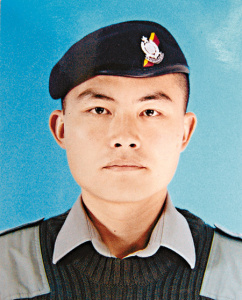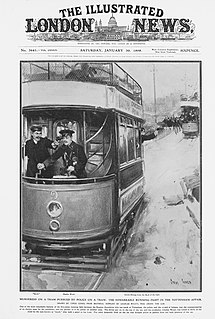Related Research Articles
The George Cross (GC) is the highest award bestowed by the British government for non-operational gallantry or gallantry not in the presence of an enemy. In the British honours system, the George Cross, since its introduction in 1940, has been equal in stature to the Victoria Cross, the highest military gallantry award. It is awarded "for acts of the greatest heroism or for most conspicuous courage in circumstance of extreme danger", not in the presence of the enemy, to members of the British armed forces and to British civilians. Posthumous awards have been allowed since it was instituted. It was previously awarded to residents of Commonwealth countries, most of which have since established their own honours systems and no longer recommend British honours. It may be awarded to a person of any military rank in any service and to civilians including police, emergency services and merchant seamen. Many of the awards have been personally presented by the British monarch to recipients or, in the case of posthumous awards, to next of kin. The investitures are usually held at Buckingham Palace.
Stewart Graeme Guthrie, GC was a New Zealand Police sergeant and is the most recent Commonwealth civilian recipient of the George Cross, the highest award for conspicuous gallantry not in the face of an enemy awarded in certain Commonwealth countries. He received the award for his role in the police response to the Aramoana massacre, in which he lost his life.
The Walsh Street police shootings were the 1988 murders of two Victoria Police officers: Constables Steven Tynan, 22, and Damian Eyre, 20.
This is a timeline of major crimes in Australia.

Keith George Faure, from Norlane, Victoria, is an Australian career criminal, convicted of multiple murders and manslaughters. He is currently serving life imprisonment with a minimum non-parole period of 19 years for his role in two murders related to the Melbourne gangland killings. Faure's criminal history includes further convictions for armed robbery and breaking and entering.

Tsui Po-ko was a Police Constable of the Hong Kong Police Force, murderer and bank robber.

The New Zealand Cross (NZC) is New Zealand's highest award for bravery not in the face of the enemy. It was instituted by Royal Warrant on 20 September 1999 as part of the move to replace British bravery awards with a distinct New Zealand bravery system. The medal, which may be awarded posthumously, is granted in recognition of "acts of great bravery in situations of extreme danger". The medal is primarily a civilian award, but it is also awarded to members of the armed forces who perform acts of bravery in non-operational circumstances (given that the New Zealand gallantry awards may only be awarded "while involved in war and warlike operational service ".

Eric George Bailey GC was a sergeant with the New South Wales Police Force and a posthumous Australian recipient of the George Cross, the highest civil decoration for heroism in the United Kingdom and formerly in the Commonwealth.
Frederick William Fairfax GC was a British policeman awarded the George Cross for his heroism in chasing the armed robbers Derek Bentley and Christopher Craig on 2 November 1952. The pair had broken into a warehouse in Croydon and were pursued by Fairfax onto the roof of the building. Fairfax grabbed Bentley then Craig shot him, grazing his shoulder. Despite his injury, the unarmed Fairfax chased Bentley and managed to arrest and subdue him. More officers arrived at the scene and Constable Sidney Miles scaled the roof, to be shot dead by Craig, who then jumped from the roof after expending his ammunition, injured himself upon landing, and was arrested. The award of the medal was announced in the London Gazette of 6 January 1953, as were the George Medals awarded to Police Constables Norman Harrison and James McDonald. Police Constable Robert Jaggs was given the British Empire Medal and Police Constable Miles was posthumously awarded the Queen's Police Medal for Gallantry.

Henry William Stevens GC was awarded the George Cross for the gallantry he showed while serving as a constable in the Metropolitan Police on 29 March 1958.
The Linwood bank robbery was a bank robbery that occurred in Linwood, near Glasgow, in 1969. Three police officers were shot in the aftermath and two officers were later awarded George Medals. The lead robber, Howard Wilson, served 32 years in prison for the robbery, the murder of two officers and the attempted murder of a third; he was paroled in 2002.

Henry Byrne and John Morley, two officers of the Garda Síochána, the police force of Ireland, were murdered on 7 July 1980 by alleged members of the Irish National Liberation Army (INLA). The officers' deaths provoked national outrage. Three men were apprehended, convicted, and sentenced to death for capital murder. Two of the sentences were later reduced to 40 years imprisonment while the third was overturned.

The Tottenham Outrage of 23 January 1909 was an armed robbery in Tottenham, North London, that resulted in a two-hour chase between the police and armed criminals over a distance of six miles (10 km), with an estimated 400 rounds of ammunition fired by the thieves. The robbery, of workers' wages from the Schnurmann rubber factory, was carried out by Paul Helfeld and Jacob Lepidus, Jewish Latvian immigrants. Of the twenty-three casualties, two were fatal and several others serious, among them seven policemen. The two thieves committed suicide at the end of the pursuit.

The Napier shootings took place on 7 May 2009 in Napier, New Zealand. At around 9.30 am, Jan Molenaar fired on police officers executing a cannabis search warrant at his house at 41 Chaucer Road, killing Senior Constable Len Snee and seriously injuring senior constables Bruce Miller and Grant Diver. A neighbour attempting to assist the police was also shot.
The 1991 New Zealand bravery awards were announced via a Special Honours List dated 19 December 1991. Twelve of the 33 recipients were recognised for acts of bravery during the Aramoana Massacre on 13 November 1990.
The 1987 New Zealand bravery awards were announced via a Special Honours List on 27 August 1987, and recognised ten people for acts of bravery between 1984 and 1986.
The 1999 New Zealand bravery awards were announced via a special honours list on 23 October 1999. The awards recognised 30 people, including six posthumously, for acts of bravery between 1989 and 1998.
The 2008 New Zealand bravery awards were announced via a special honours list on 3 May 2008, and recognised five people for acts of bravery between 2004 and 2006.
The 2005 New Zealand bravery awards were announced via a special honours list on 29 January 2005, and recognised 26 people, including four posthumously, for acts of bravery between 1999 and 2004.
Baden Henry Skitt, known as Bill Skitt, was a British police officer.
References
- ↑ Police swoop on gangland suspect , The Age, 20 May 2004. Retrieved 14 October 2008
- ↑ John Silvester, Let's make a deal , The Age, 4 May 2008. Retrieved 14 October 2008
- ↑ "No. 47582". The London Gazette (Supplement). 3 July 1978. p. 8045.
- ↑ George Cross Database entry – Michael Kenneth PRATT, GC (Living Recipient) Retrieved 14 October 2008 Archived 15 February 2005 at the Wayback Machine